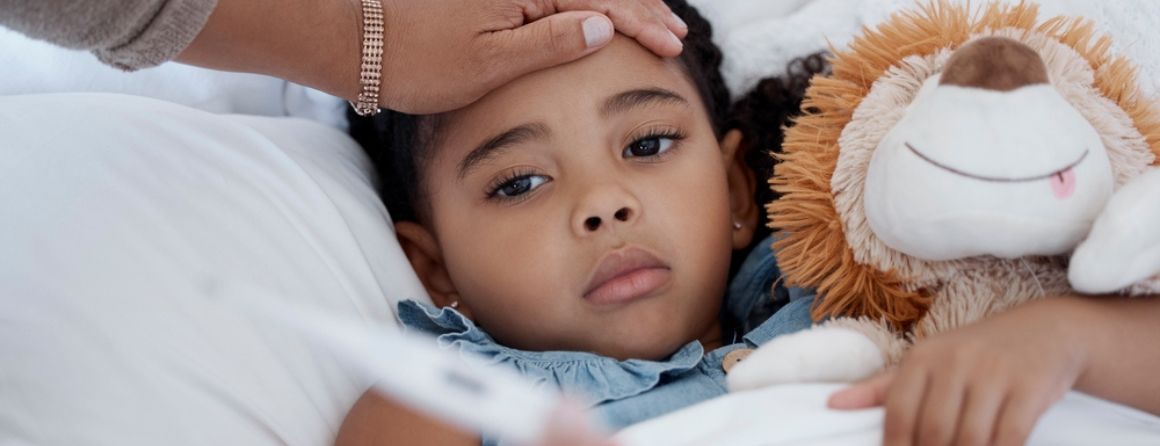Children with COVID-19 treated safely at home, helping to take burden off hospitals

Children with COVID-19 can be treated safely at home, helping to take the burden off the hospital system, according to a new study.
The research, led by Murdoch Children’s Research Institute and published in Archives of Disease in Childhood, found COVID-positive children with moderate symptoms or pre-existing high-risk conditions could be treated effectively via a Hospital-in-the-Home (HITH) program. Additionally, many more sick children without COVID-19 were treated at home during the pandemic.
Murdoch Children’s Dr Laila Ibrahim said the program took pressure off paediatric emergency departments and helped reduce COVID-19 transmission in hospital during the first two years of the pandemic.
“Children do better if it’s possible to manage them at home and the infectious nature of SARS-CoV-2 increased the imperative to try to keep children out of hospital,” she said.
“These findings reassure us that care at home has been safe and effective regardless of COVID strain and this takes the burden off inpatient care.”
The study involved 3719 children, aged 0-18 years, referred from The Royal Children’s Hospital or the Victorian Department of Health to HITH care from March 2020 to March 2022. It found 421 children with COVID-19 and 3,298 children without COVID-19 received treatment at home, many avoiding hospitalisation altogether.
Of the COVID positive patients, 63 per cent were high risk and 33 per cent were moderately unwell. Only 10 per cent of children were readmitted to hospital with just 5 per cent needing medical intervention.
The research recorded a 21 per cent increase in patients admitted to the HITH program and a 132 per cent jump in telehealth appointments.
Murdoch Children’s Associate Professor Penelope Bryant said prior to the COVID-19 pandemic, treatment of children in out-of-hospital settings as an alternative to hospitalisation was increasingly in demand.
“The benefits of being treated in the home care include improved child quality of life, higher parent satisfaction and avoidance of hospital-acquired infections. We advocate that where possible children should be cared for at home rather than hospital, knowing the severe impact of the pandemic on children’s mental health,” she said.
Researchers from The Royal Children’s Hospital and the University of Melbourne also contributed to the research.
Publication: Penelope A. Bryant, Joanna Lawrence, Suzanne L. Boyce, Catherine M. Simpson, Gemma Sinclair, Candie Chong, Phillipa Lewis, Stephanie Lee, Rebecca Hughes, Samuel Dalton, Cara Lacey, Lauren C. Nisbet, Tessa E. Smith, Sarah Chapman, Swathi Lakshminarayanan, Kahlia Hurd, Katie Smith, Brenda Savill and Laila F. Ibrahim. ‘Hospital bed-replacement for acute care of children at home during the COVID-19 pandemic through a Hospital-in-the-Home program,’ Archives of Disease in Childhood. DOI: 10.1136/archdischild-2022-325004
*The content of this communication is the sole responsibility of the Murdoch Children’s and does not reflect the views of the NHMRC.
Available for interview:
Associate Professor Penelope Bryant, Murdoch Children’s Group Leader, Infection and Immunity
Dr Laila Ibrahim, Murdoch Children’s Clinician Scientist Fellow, Infection and Immunity
Media Contact:
Bridie Byrne
Murdoch Children’s Media Manager
P: +61 457 365 848
E:
show email address
About Murdoch Children’s Research Institute
Murdoch Children's Research Institute is the largest child health research institute in Australia committed to making discoveries and developing treatments to improve child and adolescent health in Australia and around the world. They are pioneering new treatments, trialling better vaccines and improving ways of diagnosing and helping sick babies, children and adolescents. It is one of the only research institutes in Australia to offer genetic testing to find answers for families of children with previously undiagnosed conditions.
Funding:
No specific funding was received for this study. A/Prof Penelope Bryant is partially funded by a Medical Research Future Fund Investigator Grant and a Melbourne Children’s Clinician-Scientist Fellowship funded by The Royal Children’s Hospital Foundation and the Australasian HITH Society’s Dr Nicholas Collins Fellowship. Dr Laila Ibrahim is partially funded by a Melbourne Children’s Campus Clinician-Scientist Fellowship funded by The Royal Children’s Hospital Foundation. Research through the Murdoch Children’s Research Institute is in part supported by the Victorian Government infrastructure support program.



